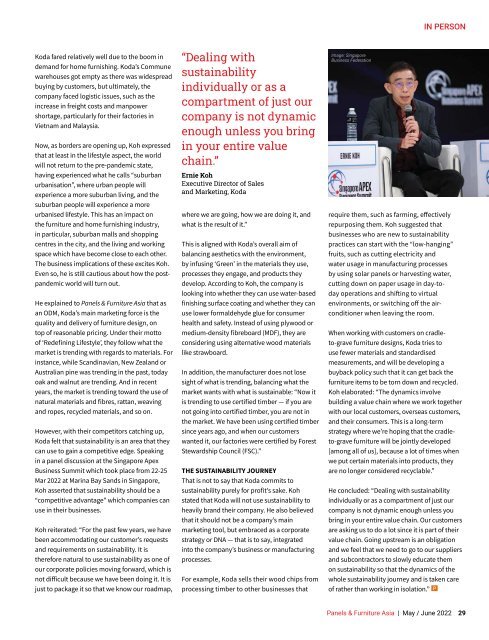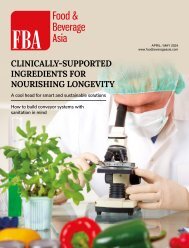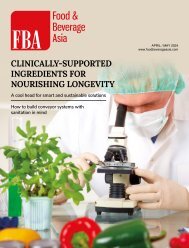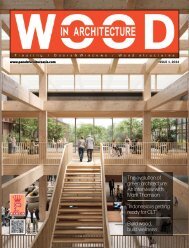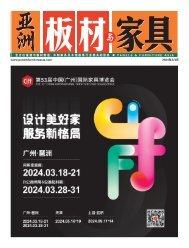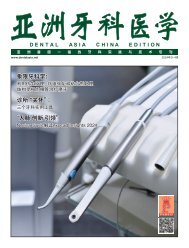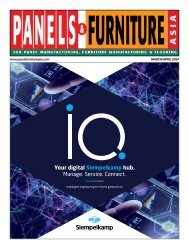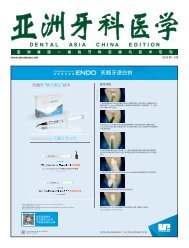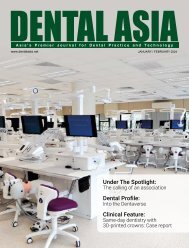Panels & Furniture Asia May/June 2022
Panels & Furniture Asia (PFA) is a leading regional trade magazine dedicated to the woodbased panel, furniture and flooring processing industry. Published bi-monthly since 2000, PFA delivers authentic journalism to cover the latest news, technology, machinery, projects, products and trade events throughout the sector. With a hardcopy and digital readership comprising manufacturers, designers and specifiers, among others, PFA is the platform of choice for connecting brands across the global woodworking landscape.
Panels & Furniture Asia (PFA) is a leading regional trade magazine dedicated to the woodbased panel, furniture and flooring processing industry. Published bi-monthly since 2000, PFA delivers authentic journalism to cover the latest news, technology, machinery, projects, products and trade events throughout the sector. With a hardcopy and digital readership comprising manufacturers, designers and specifiers, among others, PFA is the platform of choice for connecting brands across the global woodworking landscape.
Create successful ePaper yourself
Turn your PDF publications into a flip-book with our unique Google optimized e-Paper software.
IN PERSON<br />
Koda fared relatively well due to the boom in<br />
demand for home furnishing. Koda’s Commune<br />
warehouses got empty as there was widespread<br />
buying by customers, but ultimately, the<br />
company faced logistic issues, such as the<br />
increase in freight costs and manpower<br />
shortage, particularly for their factories in<br />
Vietnam and Malaysia.<br />
Now, as borders are opening up, Koh expressed<br />
that at least in the lifestyle aspect, the world<br />
will not return to the pre-pandemic state,<br />
having experienced what he calls “suburban<br />
urbanisation”, where urban people will<br />
experience a more suburban living, and the<br />
suburban people will experience a more<br />
urbanised lifestyle. This has an impact on<br />
the furniture and home furnishing industry,<br />
in particular, suburban malls and shopping<br />
centres in the city, and the living and working<br />
space which have become close to each other.<br />
The business implications of these excites Koh.<br />
Even so, he is still cautious about how the postpandemic<br />
world will turn out.<br />
He explained to <strong>Panels</strong> & <strong>Furniture</strong> <strong>Asia</strong> that as<br />
an ODM, Koda’s main marketing force is the<br />
quality and delivery of furniture design, on<br />
top of reasonable pricing. Under their motto<br />
of ‘Redefining Lifestyle’, they follow what the<br />
market is trending with regards to materials. For<br />
instance, while Scandinavian, New Zealand or<br />
Australian pine was trending in the past, today<br />
oak and walnut are trending. And in recent<br />
years, the market is trending toward the use of<br />
natural materials and fibres, rattan, weaving<br />
and ropes, recycled materials, and so on.<br />
However, with their competitors catching up,<br />
Koda felt that sustainability is an area that they<br />
can use to gain a competitive edge. Speaking<br />
in a panel discussion at the Singapore Apex<br />
Business Summit which took place from 22-25<br />
Mar <strong>2022</strong> at Marina Bay Sands in Singapore,<br />
Koh asserted that sustainability should be a<br />
“competitive advantage” which companies can<br />
use in their businesses.<br />
Koh reiterated: “For the past few years, we have<br />
been accommodating our customer’s requests<br />
and requirements on sustainability. It is<br />
therefore natural to use sustainability as one of<br />
our corporate policies moving forward, which is<br />
not difficult because we have been doing it. It is<br />
just to package it so that we know our roadmap,<br />
“Dealing with<br />
sustainability<br />
individually or as a<br />
compartment of just our<br />
company is not dynamic<br />
enough unless you bring<br />
in your entire value<br />
chain.”<br />
Ernie Koh<br />
Executive Director of Sales<br />
and Marketing, Koda<br />
where we are going, how we are doing it, and<br />
what is the result of it.”<br />
This is aligned with Koda’s overall aim of<br />
balancing aesthetics with the environment,<br />
by infusing ‘Green’ in the materials they use,<br />
processes they engage, and products they<br />
develop. According to Koh, the company is<br />
looking into whether they can use water-based<br />
finishing surface coating and whether they can<br />
use lower formaldehyde glue for consumer<br />
health and safety. Instead of using plywood or<br />
medium-density fibreboard (MDF), they are<br />
considering using alternative wood materials<br />
like strawboard.<br />
In addition, the manufacturer does not lose<br />
sight of what is trending, balancing what the<br />
market wants with what is sustainable: “Now it<br />
is trending to use certified timber — if you are<br />
not going into certified timber, you are not in<br />
the market. We have been using certified timber<br />
since years ago, and when our customers<br />
wanted it, our factories were certified by Forest<br />
Stewardship Council (FSC).”<br />
THE SUSTAINABILITY JOURNEY<br />
That is not to say that Koda commits to<br />
sustainability purely for profit’s sake. Koh<br />
stated that Koda will not use sustainability to<br />
heavily brand their company. He also believed<br />
that it should not be a company’s main<br />
marketing tool, but embraced as a corporate<br />
strategy or DNA — that is to say, integrated<br />
into the company’s business or manufacturing<br />
processes.<br />
For example, Koda sells their wood chips from<br />
processing timber to other businesses that<br />
Image: Singapore<br />
Business Federation<br />
require them, such as farming, effectively<br />
repurposing them. Koh suggested that<br />
businesses who are new to sustainability<br />
practices can start with the “low-hanging”<br />
fruits, such as cutting electricity and<br />
water usage in manufacturing processes<br />
by using solar panels or harvesting water,<br />
cutting down on paper usage in day-today<br />
operations and shifting to virtual<br />
environments, or switching off the airconditioner<br />
when leaving the room.<br />
When working with customers on cradleto-grave<br />
furniture designs, Koda tries to<br />
use fewer materials and standardised<br />
measurements, and will be developing a<br />
buyback policy such that it can get back the<br />
furniture items to be torn down and recycled.<br />
Koh elaborated: “The dynamics involve<br />
building a value chain where we work together<br />
with our local customers, overseas customers,<br />
and their consumers. This is a long-term<br />
strategy where we’re hoping that the cradleto-grave<br />
furniture will be jointly developed<br />
[among all of us], because a lot of times when<br />
we put certain materials into products, they<br />
are no longer considered recyclable.”<br />
He concluded: “Dealing with sustainability<br />
individually or as a compartment of just our<br />
company is not dynamic enough unless you<br />
bring in your entire value chain. Our customers<br />
are asking us to do a lot since it is part of their<br />
value chain. Going upstream is an obligation<br />
and we feel that we need to go to our suppliers<br />
and subcontractors to slowly educate them<br />
on sustainability so that the dynamics of the<br />
whole sustainability journey and is taken care<br />
of rather than working in isolation.” P<br />
<strong>Panels</strong> & <strong>Furniture</strong> <strong>Asia</strong> | <strong>May</strong> / <strong>June</strong> <strong>2022</strong> 29


